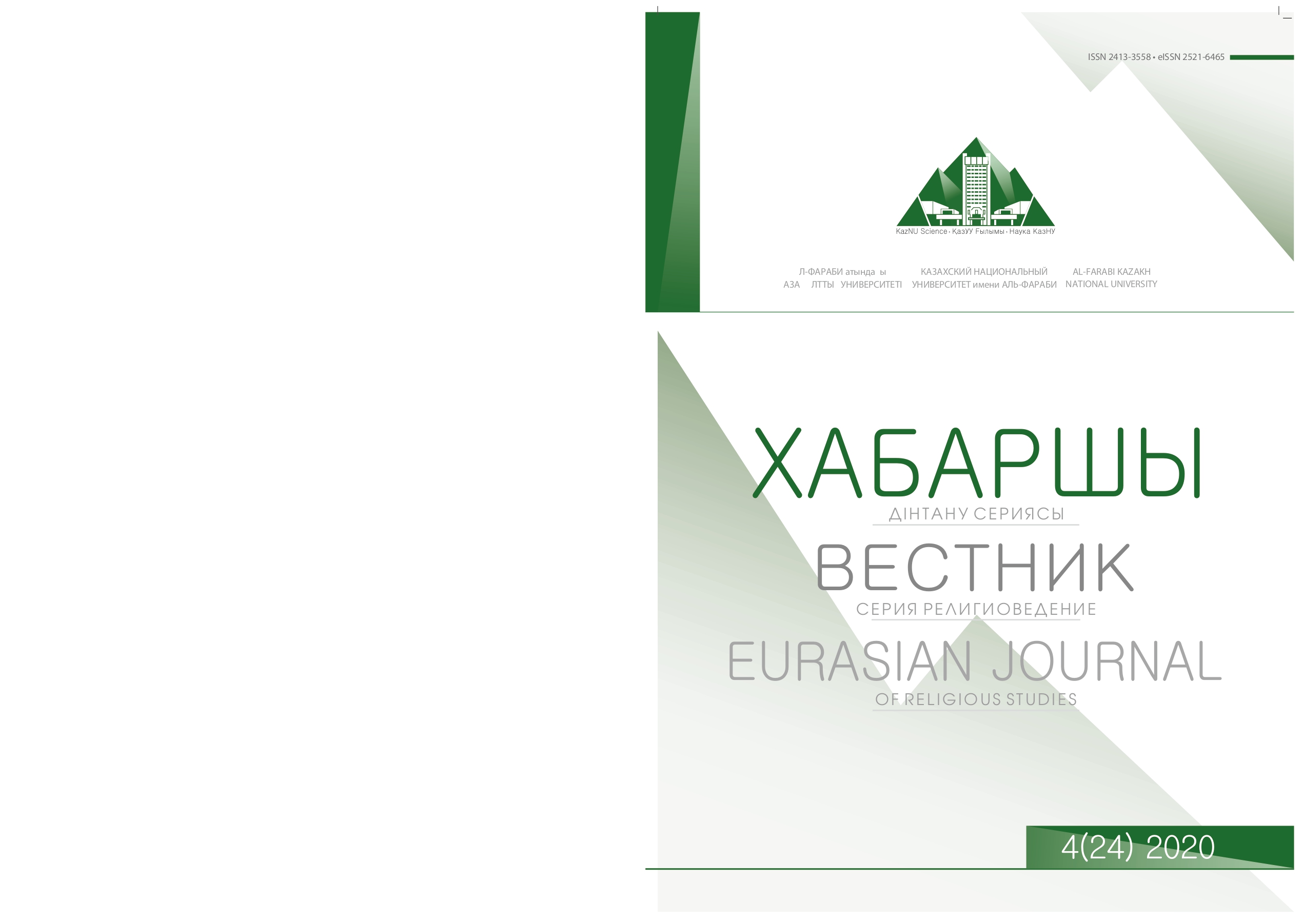Препятствия внешних секулярных ожиданий в эпоху пост-ИГИЛ
DOI:
https://doi.org/10.26577/EJRS.2020.v24.i4.r5Ключевые слова:
секуляризм, эпоха пост-ИГИЛ, Средняя Азия, курды, национальная безопасность, вестернизацияАннотация
После уничтожения физической силы ИГИЛ (Исламское Государство Ирака и Леванта - Исламское Государство Ирака и Сирии) в районе его операций, национальный вопрос в регионе начал быстро развиваться с точки зрения постконфликтного восстановления. В период пост-ИГИЛ партизанские отряды или, скорее, местные этнические независимые силы оставались укорененными в местной религиозной общине и религиозной культуре. Националистические силы, которые стремятся мобилизовать подавляющее большинство населения для достижения своих целей, должны быть в состоянии удовлетворить их политическими идеями, ведущими к гармонии и сотрудничеству. Причина этого в том, что этой цели соответствуют глубоко укоренившиеся религиозные традиции данного региона. В этой статье утверждается, что, хотя Запад также заинтересован в установлении регионального светского порядка и светского режима преемственности, если национализм здесь ограничивает свой религиозный облик запланированной региональной автономией и независимостью от внешнего мира, тактически избегая скептицизм внешнего мира, то ожидаемая политическая цель не достигается запланированным образом, и тогда возможно, что репрессированная национальная религия может нанести ответный удар в будущем.
Библиографические ссылки
Amartya Sen, Identity and Violence, New York: W. W. Norton & Co., 2006, p. 70.
Amatzia Baram, “From Militant Secularism to Islamism: The Iraqi Ba’th Regime 1968-2003 Samuel P. Huntington, The Solider and the State, Cambridge: Huntington, 1957, p. 409.
Seymour Martin Lipset, Consensus and Conflict: Essays in Political Sociology, New Brunswick: Transcation Books, 1985, p. 284.
Steve Reicher and Nick Hopkins, Self and Nation: Categorization, Contestation and Mobilization, London: Sage, 2001, p. 25.
Walid,” Woodrow Wilson International Center for Scholars, Oct. 2011, p. 8, https://www.wilsoncenter.org/sites/default/files/From%20Militant%20Secularism%20to%20Islamism.pdf.
Andreas Armborst, “Radicalisation and De-radicalisations of Social Movements: The Comeback of Political Islam?” Crime, Law and Social Change, Vol. 63, No. 3, 2014, pp. 254-255.
Beverley Milton-Edwards, “Islamist Versus Islamist: Rising Challenge in Gaza,” Terrorism and Political Violence, Vol. 26, 2014, p. 268.
Borzou Daragahi, “Meet the Middle East’s Peace of Westphalia Re-enactors,” Foreign Policy,
Edwin Smith, Quasi-Religions: Humanism, Marxism and Nationalism, Houndmills, Basingstoke August 10, 2018, https://foreignpolicy.com/2018/08/10/meet-the-middle-easts-peace-of-westphalia-reenactors-iran-saudi-arabia-syria/.
C. Marvin and D. W. Ingle, Blood Sacrifice and the Nation, Cambridge: Cambridge University Press, 1999, pp. 1-5.
C. Taylor, “The Politics of Recognition,” in A. Gutmann, ed., Multiculturalism: Examining the Politics of Recognition, Princeton: Princeton University Press, 1994, pp. 32-37.
Cliff May, “Militant Islamism, Islamism, Islam,” Townhall, Jan. 19, 2012, https://townhall.com/columnists/cliffmay/2012/01/19/militant-islamism-islamism-islam-n922971.
David D. Latin, Hegemony and Culture: Politics and Religious Change among the Yoruba, Chicago: University of Chicago Press, 1986, p.175.
Faruk Ekmekci, “Understanding Kurdish Ethno-nationalism in Turkey: Socio-Economy, Religion, and Politics,” Ethnic and Racial Studies, Vol. 34, No. 9, 2011, p. 1615.
Hedley Bull, “The Revolt Against the West,” in Hedley Bull and Adam Watson eds., The Expansion of International Society, Oxford: Clarendon Press, 1984, p. 217.
John, Hampshire: Palgrave Macmillan, 1994, p. 1.
John L. Esposito and John O. Voll, “Islam and the West: Muslim Voice of Dialogue,” in Pavlos Hatzopoulos and Fabio Petito eds., Religion in International Relations: The Return from Exile, New York: Palgrave Macmillam, 2003, pp. 238-239.
John Mueller, The Remnants of War, Ithaca: Cornell University Press, 2004, p. 15.
Jonathan Fox, Religion, Civilization, and Civil War: 1945 through the Millennium, Lanham: Lexington Books, 2004, pp. 25-26.
Magnus Norell, “Militant Islamism: A Strategic Threat,” Huffpost, August 7, 2014, https://www.huffingtonpost.com/magnus-norell/militant-jihadism-a-strat_b_5546469.html.
Mark Juergensmeyer, Global Rebellion: Religious Challenges to the Secular State: From Christian Militias to al Qaeda, Berkeley: University of California Press, 2008, p. 10.
Mark Juergensmeyer, The New Cold War? Religious Nationalism Confronts the Secular State, Berkeley and Los Angeles: University of California Press, 1993, p. 35.
Martha Finnemoure, The Purpose of Intervention: Changing Beliefs About the Use of Force, Ithaca: Cornell University Press, 2004, pp. 58-60.
Michael Axworthy and Patrick Milton, “A Westphalian Peace for the Middle East: Why an Old Framework Could Work,” Foreign Affairs, October 10, 2016, https://www.foreignaffairs.com/articles/europe/2016-10-10/westphalian-peace-middle-east.
Michael E. Brint, A Genealogy of Political Culture, Boulder: Westview Press, 1991, p. 172.
Michael Mann, The Dark Side of Democracy, Cambridge: Cambridge University Press, 2005, p. 55.
Omer Tekdemir, “The reappearance of Kurdish Muslims in Turkey: the articulation of religious identity in a national narrative,” British Journal of Middle Eastern Studies, 2018, DOI: 10.1080/13530194.2018.1430534, p. 7.
Reuven Paz, “Jihadists and nationalist Islamists: Al-Qa'ida and Hamas,” in Assaf Moghadam and Brian Fishman, eds., Fault Lines in Global Jihad: Organizational, Strategic and Ideological Fissures, London: Routledge, 2011, p. 203.
Richard Ned Lebow, A Cultural Theory of International Relations, Cambridge: Cambridge University Press, 2008, p. 122.
Robert Jervis, The Logic of Images in International Relations, Princeton, N.J.: Princeton University Press, 1970, p.62.
Phares, The War of Ideas: Jihadism against Democracy, New York: Palgrave Macmillan, 2007, p. 39.
Youssef H. Aboul-Enein, Militant Islamist Ideology: Understanding the Ideology and the Challenge to America, Annapolis: Naval Institute Press, 2010.
Yuan Zhang, “ISIS: Quasi-Sovereignty and Regional Security,” Journal of International Security Studies, Vol. 34, No. 6, 2016, p. 50.
Zachary Devlin-Foltz and Binnur Ozkececi-Taner, “State Collapse and Islamist Extremism: Re-evaluating the Link,” Contemporary Security Policy, Vol. 31, No. 1, 2010, p. 102.
1. “Syrian Government Calls on Refugees to Return Home,” NBC News, July 4, 2018, https://www.nbcnews.com/news/world/syrian-government-calls-refugees-return-home-n888791.
2. “Refugees Situations,” UNHCR, August 2, 2018, https://data2.unhcr.org/en/situations/syria.













